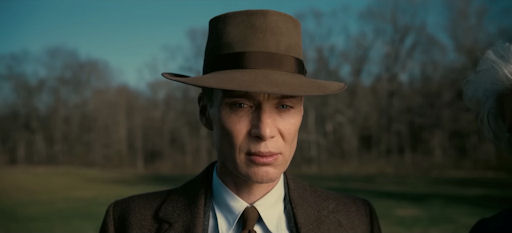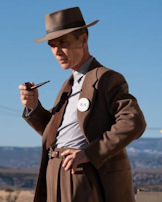J. Robert Oppenheimer, considered the father of the atomic bomb, was a major figure, first in theoretical physics and then in popular imagination, during the first half of the 20th century.
Many people today have heard of Oppenheimer, but as the leader of the Manhattan Project, which produced the atomic bomb later dropped on the non-military Japanese cities of Hiroshima and Nagasaki. Fewer know of his attempts to place nuclear weapons under the control of the United Nations. It was this attempt, plus his friendship with known communist sympathizers, his inability to adequately defend himself, and the ruthless political jockeying for power in the 1950s that led to his downfall. He died a conflicted man in 1967, at the age of 62.
Director/writer Christopher Nolan has chosen to take on a project of enormous scope and complexity. While the film is primarily about the title character, it is also about the communist party in America, the fear of Nazi technology, the tightly-knit group of theoretical Jewish physicists that gathered in the West as Nazi antisemitism drove them out, the immensely complex Manhattan project, the relationship between the scientists and the US military, the rise of nuclear militarism after the fall of Japan, the McCarthy era, and the terrible human frailties of people, mostly men, who handed the equivalent of a loaded gun to a world with little more sense than a toddler while at the same time denying any responsibility for what might happen.
This is, quite simply, a task beyond the capacity of a single film, even a two hour and fifty-five minute one.
The result is a tremendous crush of real-life characters with little development, excessive flashes forward and backward, with some in color and others in black and white, and of course the usual liberties taken with historical fiction or fictionalized history.
The film is studded with great performances, from Cillian Murphy (“Peaky Blinders”) as the chainsmoking, womanizing, egotistical, conflicted Oppenheimer, to Matt Damon as General Leslie Groves, to Robert Downey Jr. as Oppenheimer’s secret nemesis Lewis Strauss, to Emily Blunt as Kitty Oppenheimer, in what is basically a man’s movie, and Gary Oldman in a brief, disturbing cameo as Harry Truman.
Despite his own “Manhattan Project” sized project, Nolan keeps the pacing and does an incredible job of building the suspense as the seconds pass before the “Trinity” test. We all know it will work, and yet Nolan still makes it a cliff-hanger. Lesser directors could learn a lot from watching Nolan’s work here.
All technical aspects are beyond expectations.
This is, as I mentioned, a very long and very complex film – perhaps best appreciated through more than one viewing. One could even think of it as two films: the first two-thirds leading up to Trinity (although mixed with back and forward flashes), and the last third dealing with the political aftermath for Oppenheimer and the world.

. . .
Join us on Facebook at
http://www.facebook.com/itsjustmovies!
